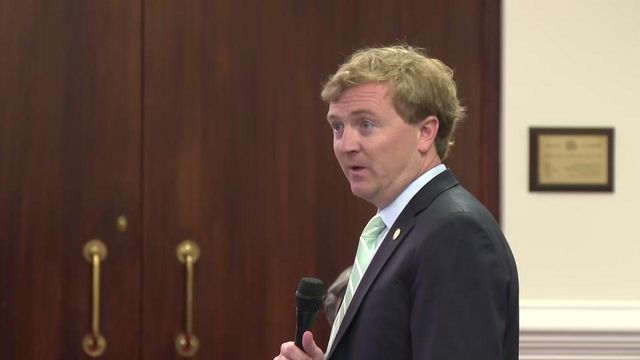What parents can expect under NC's new parents' law for schools

North Carolina school systems are working to comply with a new state law designed to expand information available to parents, including information on their children’s mental health or gender identity.
Senate Bill 49, which Republican sponsors called the Parents' Bill of Rights, is limited in scope to a parent’s relationship with their child’s school; it doesn’t give people access to information about other people’s children. But it does require schools to disclose more information about students to their parents.
Here’s what parents can expect to see in 2024.
Parents’ guide to student achievement. Schools must provide a guide to parents that includes key school information on how to monitor their child’s educational progress and how to help their child succeed in school.
These plans must be in writing and discussed in beginning-of-year meetings with parents and students. They must include requirements for moving up to the next grade level, information on course materials, lists of services available, information on academic programs, information on other private or charter schools their children could apply to attend, among other things.
How some information will be made available could vary. Wake County school board members have decided not to require schools to put the information on their school website, because most school websites are volunteer-managed and can contain out-of-date information. The board would prefer to post the information online when it can shore up its website management.
Promoting parental involvement. Schools must adopt policies to encourage parents to be involved in schools. It’s a new requirement, but most already do this, according to the North Carolina School Boards Association.
Timely responses to parent information requests. Schools must respond within 20 business days to parents’ requests for information the parent has the established right to ask for. That could include curriculum or their child’s academic records.
Notification of a change in name or pronouns. The law states schools need to notify a parent of a child’s desire to change their name or pronoun, but only if the child has asked school personnel to call them by a different name or pronoun. Notification must occur before staff can call the student by another name. Parental permission isn’t required before the new name or pronoun may be used. If a student goes by a different name or pronoun among their friends but doesn’t ask school employees to call them by the different name or pronoun, school employees don’t need to tell parents. School employees are also not required to ask permission to call the student by another name. But, depending on the school system, they would need parent permission to change the child’s name in school records, per record-keeping policies entirely separate from the law. Wake County, for example, requires permission to change names in its student information system. Cumberland County, for example, doesn’t.
The name-change rules can be confusing, though. The North Carolina School Boards Association has advised school districts and boards that the law requires notification of any name change, including a nickname. While it still won’t require parental permission to use a nickname, parents would need to be notified if their child named “William” wishes to go by “Will.”
That’s how Orange County Schools will approach it, too, according to regulations approved by the school board. Applying the same approach to all students, including those who aren’t transgender, is intended to “avoid claims of gender-based discrimination.” Attorneys for the Wake County Public School System provided the same advice, according to records obtained by WRAL News.
Some school boards have added layers to the notification process.
Orange County Schools, for example, will require principals to consult students and either a school counselor or district director of social services before notifying families. Educators are asked to remind students of the parental notification requirement.
Buncombe County Schools, in Western North Carolina, asks principals to consult with students about any concerns they might have with their parents being notified.
The law carves out an exception for the parental notification requirement. If school personnel believe a child would become at risk of abuse or neglect if their parents were notified, then disclosure isn’t required. However, it’s unclear how school personnel would make that decision.
Restricting instruction related to sexuality. The new law prohibits instruction related to sexuality, sexual orientation and gender identity prior to fifth grade. The law defines instruction as curriculum and course materials, including “supplementary materials.” Teachers’ “responses to student-initiated questions” on those topics are exempt from the law. The law doesn’t list library books under instructional materials, but at least one school system — Johnston County — has decided to remove library books that may contain discussion of those items from its elementary schools. Other school boards have determined library books don’t count as supplementary materials.
Confusion over the law has caused some school districts to pause programs for children intended to prevent or stop sexual abuse and seek clarity on whether they are allowed for younger children. State Superintendent Catherine Truitt said the Department of Public Instruction has advised schools that the programs are allowed.
Ability to appeal noncompliance with the law. If parents believe their child’s school hasn’t complied with the law, they can petition — first to the school board and eventually up to the State Board of Education. While the state board can side with the parents and order changes, the new law doesn’t give them the authority to ensure the changes are actually made.
Parents must sign off on their children being surveyed over protected information. Many schools already require parental permission for surveys asking about “protected information” to comply with federal laws. Protected information is political affiliations or beliefs; mental or psychological issues; sexual behavior or attitudes; illegal, anti-social, self-incriminating or demeaning behavior; critical appraisals of close family relationships or other close relationships; religious practices, affiliations or beliefs; and income, except for income information required to determine eligibility for financial help. Some anonymous surveys that some schools give students — including the Centers for Disease Control’s Youth Risk Behavior Survey — are exempt from this requirement. Parents and adult students must have access to the survey questions at least 10 days in advance of the survey.
Teachers can still conduct get-to-know-you surveys of students asking about only nonprotected information, such as a student’s favorite sport or food.
Some teachers on social media complained early this fall that their schools asked them to stop administering surveys, such as on a student’s favorite sports or foods, until officials could determine what surveys would be allowed.
Access to a list of materials their child has checked out from the library. Parents can request a list of books their children have checked out from school libraries. In many cases, parents may have already had access to this information. The Wake County Public School System, for example, maintains records for 12 months that parents can access. The North Carolina School Boards Association contends this portion was implied under existing law.
Prompt parental notification if a student is suspected of being a victim of any crime. If a student is a victim of a suspected crime, notification wouldn’t happen if the incident has already been reported to a county child welfare agency or law enforcement agency, and if agencies have determined parental notification would disrupt the investigation. Previously, notification was required only if the crime was suspected of occurring at school.
Employees can’t encourage kids to keep secrets from their parents. Employees who refuse to make required disclosures to parents, could be subject to unspecified disciplinary action. Separate procedures would encourage students to speak with their parents about their well-being and allow employees to help a student do so.
Access to various academic records. Parents would be able to see statewide standardized test results on their child’s report cards and report cards would show conduct and attendance, along with grades, under the new law. Schools may already provide much of this information.
Notification of school health care services. Schools would notify parents of health services offered by a school and explain how parents can consent to them. Another notification would be required when a school changes services or monitoring of a student’s mental, emotional or physical health or well-being. Schools wouldn’t need parental consent to perform emergency health care services, such as cardiopulmonary resuscitation (CPR) or use of an EpiPen.











